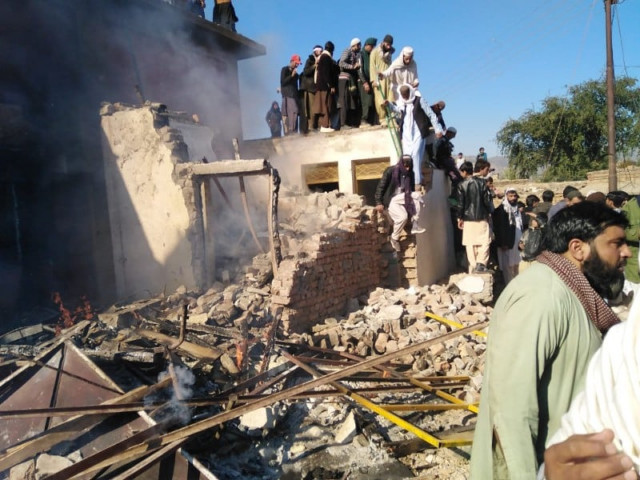SC orders immediate reconstruction of Hindu temple in Karak
CJ Gulzar Ahmed says policemen who failed to protect sacred Hindu place be held accountable

The country’s top court has directed the Evacuee Trust Property Board (ETPB) chairman to immediately visit the site of the destroyed Hindu temple in southern Karak district of Khyber-Pakhtunkhwa and begin its reconstruction.
A three-judge bench, presided over by Chief Justice of Pakistan Gulzar Ahmed, issued this order on Tuesday while hearing a suo motu case regarding destruction of a Hindu religious site by a mob.
The mob, reportedly led by a firebrand cleric Maulvi Sharif, on December 30 vandalised the temple, which, though no longer functional, is considered a revered pilgrimage site by the Hindu community.
The historic temple had stopped offering religious service after the 1947 partition when all local Hindu families migrated to India. However, four years ago, the unfrequented temple was handed over to the Hindu community on the Supreme Court’s order. And it has been a pilgrimage site for Hindus ever since.
According to reports, local clerics were not happy with the handover of the temple to the Hindu community. The ongoing renovation had reportedly fuelled their anger which set off a chain of events that led to last Wednesday’s vandalism, residents had told The Express Tribune.
Expressing displeasure over his performance, the apex court asked the ETPB chairman to submit details of the cases pending against properties belonging to the board as well as details of functional and non-functional temples.
The bench also ordered him to take action against the ETPB officials involved in facilitating land grabbing of protected properties. The bench also directed him to submit a performance report.
'ETPB failed to protect temple'
Appearing before the bench, Minority Commission Chairman Shoaib Suddle said the K-P ETPB had failed to protect the temple site, adding that the incident had brought disrepute to the whole country.
Justice Ijazul Ahsan, a member of the bench, asked the K-P inspector-general police (IGP) how the incident occurred despite a police picket being located close to the temple. “What were the agencies doing when so many people gathered?” the judge inquired.
The IGP replied that 92 officers including a superintendent police (SP) and a deputy superintendent police (DSP) had been suspended and that a case would be filed against the negligent police personnel. Around 109 people involved in the attack are also under arrest, he said.
However, CJ Gulzar Ahmed remarked that the job of the police was to enforce the law, adding that suspending the police personnel was not enough.
“They [policemen] will continue to receive their salaries. The incident has brought shame to the entire country. Pictures of the incident are circulating on social media around the world," the CJ remarked.
'Corruption in K-P’s ETPB'
Pakistan Hindu Council Patron-in-Chief Ramesh Kumar Vankwani told the apex court that the Hindu community held two major festivals at the temple. About 400 people visit the temple in a month.
“Maulvi Sharif had also demolished the temple in 1997,” Vankwani said.
“Despite the [SC] order, the ETBP had not restored the temple. The Hindu Council got the temple restored after paying Rs40 million,” he informed the bench.
Justice Ahsan noted the ETPB officials had money to build big buildings but not for the Hindus.
“There is a lot of corruption in K-P’s ETPB,” Vankwani said. “In 1947, [Pakistan first prime minister] Liaquat Ali Khan and [India first prime minister] Jawaharlal Nehru had signed an agreement regarding the evacuee properties,” the MNA claimed.
According to Vankwani, the agreement said in Pakistan a Hindu would be appointed as chairman of the board, whereas in India, a Muslim would be appointed as the chairman of the similar authority.
“Since 1947, the chairman of the ETPB in India has been a Muslim,” Vankwani added. Telling the MNA that a verbal mention of the agreement won't work, the CJP asked him to present the document.
“The government's writ should be maintained,” CJ Ahmed remarked, adding that "this has all been done by Maulvi Sharif”. The CJ further stated that “he [Maulvi Sharif] would be out of jail in a few days after securing bail”.
The chief secretary told the apex court's bench that a fresh contingent comprising 100 police personnel is being deployed at the temple, and the restoration work of the temple has begun immediately at the government's expense.
'Recover money from perpetrators'
However, the CJ asked the provincial chief secretary to "recover the money [for the temple's restoration] from Maulvi Sharif and his gang." “They will do the same thing again until they are made to pay up for the damage from their pockets,” he added.
The apex bench ordered authorities to submit all reports regarding the case within two weeks and adjourned the hearing. A detailed order regarding Tuesday's hearing is to be issued later.
The ETPB, a statutory board of the government of Pakistan, is a key government department which administers evacuee properties, including educational, charitable or religious trusts left behind by Hindus and Sikhs who migrated to India after partition.



















COMMENTS
Comments are moderated and generally will be posted if they are on-topic and not abusive.
For more information, please see our Comments FAQ